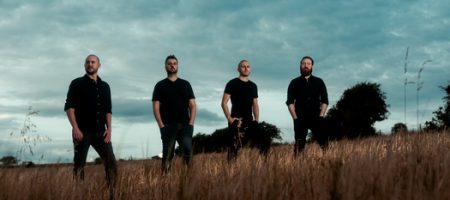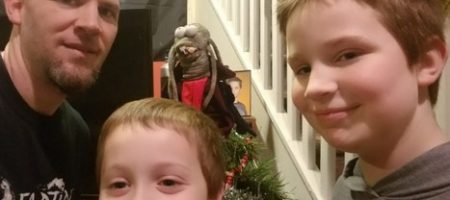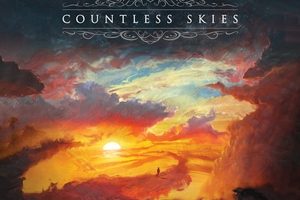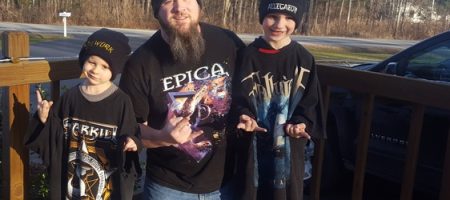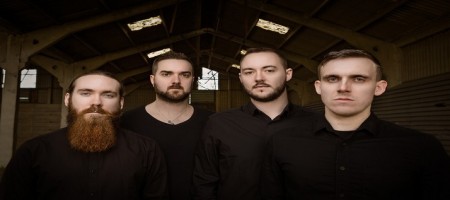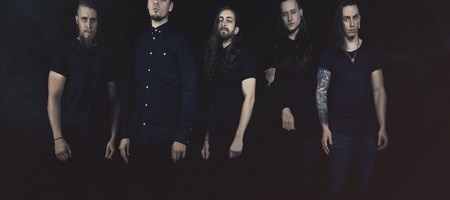Countless Skies – A New Dawn Has Arrived
Wednesday, 6th July 2016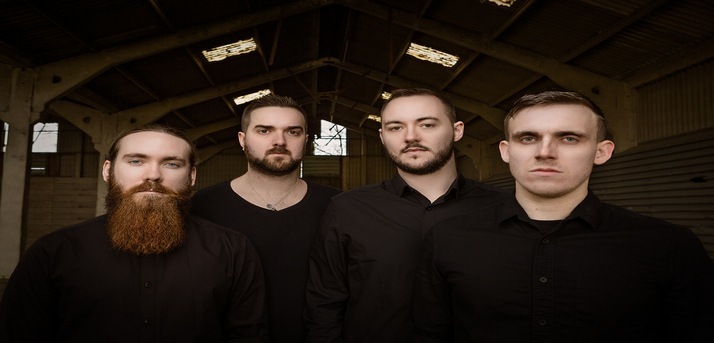
While interest in the melodic death metal genre may not be what it used to, it hasn’t stopped bands from continuing to refine and hone the sound – keeping it relevant for today’s metal audience. But it’s important to realize that you can’t just repeat the sounds of those before you. A lesson that Countless Skies has quickly picked up on, and their latest album, New Dawn, stands head-to-head with some of the best the genre has to offer.
Working off of their previous EP and single, New Dawn takes the somewhat doomy flavor that they had injected into their formula and brings things up to the next level. More intricate and infectious melodies, clean vocals, and even some experiments with speed, it’s enough to ensure that Countless Skies should be on everyone’s melodic death radar. Guitarist/vocalist Ross King was able to have a chat with us about how things have been progressing in the Countless Skies camp, artwork direction, and some intriguing events that occurred along the way to their Bloodstock gig last year.
Dead Rhetoric: How was the transition from the EP and single to writing a full-length album?
Ross King: With the EP, it was more a case of us trying to get some music ready so we could start doing other things. We didn’t want to go out and gig without having something to promote, so we sat down and wrote a few songs. We did a lot of the EP recording at home, but went to the studio just for drums. Then we mixed and mastered ourselves – our bassist Phil [Romeo] did it in his kitchen on his Mac. It was kind of like our home project. We knew that after winning Metal to the Masses and getting interest from Kolony Records – we actually got that interest after we released “Ethereal” on Bandcamp, so we hadn’t even had the whole EP up and we got a message from Lorenzo Marchello. So we knew with that interest and attention, that we needed to step it up.
Personally, I’ve been mainly focused on what’s happening now, with the band – I’m the one who books gigs, arranges things, and speaks to press – though we have a PR agent now. James [Pratt], our guitarist, kind of ran off and hid away and wrote most of the album. He takes riffs that I have written in the past – we have a vault of guitar tabs where we put stuff in and eventually pick things out. “Solace” for instance, that was a 10-second long acoustic piece that I wrote years ago. He picked it up and played around with it and turned it into the whole of “Solace.” He has definitely stepped his game up.
Dead Rhetoric: What do you feel makes the songs of New Dawn different from what you’ve done before?
King: I guess on the EP, the sound is more linear. With the album, we tried to diversify a bit more. For example, we have “Daybreak,” which has more clean vocals. “Wanderer” is quite dreamy and has some softer parts. “Incendium” plays around with blast beats and some groovier riffs. I guess it’s us trying to farther our sound.
Dead Rhetoric: There seems to be a progression through the album and the songs tend to get longer over the course of the album. Was this something intentional?
King: When we were figuring out how we wanted the album to be ordered, we wanted the faster and punchier songs at the beginning and the longer/more epic songs at the end. “Ethereal,” “Wanderer,” and “Return” are the longer songs on the album – “Solace” has a similar vibe to “Ethereal” with the doomy, Insomnium-like sound but it’s a little wishful, intentionally as well. People have said to us before that it ends quite abruptly, but I like it that way. It kicks off that last doomy melody and just sort of stops, rather than dragging out.
Dead Rhetoric: The thing that really stands out on the album are the guitar melodies. What makes a good melody in a metal song?
King: I like simple melodies to be quite honest – they get stuck in your head. I love a good harmony as well. I’m a big fan of old In Flames – they just had ridiculous harmonies. I like having a contrast as well – low guitars but high leads, like the “Ethereal” riffs. I really love a good melody that is unexpected when you listen to a song. It isn’t necessarily predictable, but it’s still present [laughs].
Dead Rhetoric: Phil Romeo contributes clean vocals on a few tracks – is moderation key in keeping the clean vocals from becoming too rote?
King: Definitely. We specifically restrained the amount of clean vocals on the album. I quite like the impact of his voice, but I feel like if we use it too much, it loses that impact. For the first three tracks, there’s no Phil at all. He doesn’t come into half way through “Solace” and you aren’t expecting it so it hits that much harder. I don’t want people to get sick of it [laughs]. I know it’s also a touchy subject as well, within melodic death metal. People can be funny about having clean vocals. We do want we want to do – I really don’t care if people don’t like clean vocals in there, because I do. I really like his style and using it where it’s needed instead of sticking it over the top of everything.
Dead Rhetoric: Another thing I really enjoyed was the artwork itself. Was there anything you really wanted to do with it? Personally I really like that color in the background – there was a Martriden album that came out late last year with a similar color that has a nice feel to it.
King: We were actually half way through planning this one when I found that album! I was like, “oh shit, someone’s already done that.” But it’s not quite the same, it’s just the colors. When we work with Carl [Ellis], he is really good at taking away what we have said to him and coming back with something, without too much guidance. We unload a bunch of random ideas on him and he comes back with something that is even better than what we are expecting. Honestly, I’m really impressed with his work. With the album cover, what we basically told him we wanted was cosmic skies – nebulas and stuff like that. We wanted it to be colorful, detailed, and we always have a little guy on the front. It’s sort of a reoccurring theme. Normally he is looking up at the sky, so we needed to see the ground. We wanted a little hill or something. As we were talking about what we wanted – we realized it would be a sunset or twilight that bleeds into space.
What I like about his art is that it is quite impressionist. You can make your own interpretation of it. On the Solace cover, he painted this forest – but they aren’t actually trees, but paintbrush marks. It’s really cool – you can sit there and zoom in on these pieces of art and there is so much detail, it’s amazing. On the Solace one, you can zoom in on the twigs and leaves on the floor, but of course they aren’t twigs and leaves but brushstrokes but you can tell that’s what it is meant to be.
Dead Rhetoric: I did notice something that was missing this time around on the cover, which I can assume why, but the Omnium Gatherum-esque symbol is absent.
King: We changed the logo, I have to admit. It’s one thing to have your band named after someone else’s song, but when your logo looks too much like another band’s – you get a lot of comments [laughs]. I didn’t want people to just look at our stuff and think that we are trying to rip off other people. I think that we make unique music – it’s definitely inspired by other bands but we do our own thing. If people look at our covers and think that we want to be such-and-such a band – sorry we are not. So we had a new logo made, by Carl as well. I’m pretty happy with how it turned out, though we don’t have a symbol…which is a shame. Carl had made the old logo as well, I guess he didn’t realize how close it was [laughs].
Dead Rhetoric: You won a spot on the Bloodstock Open Air Festival last year – any fun stories from that experience?
King: The venue that it is held [Metal to the Masses] is this place called the Castle Tavern in Luton. We were offered a gig there just after we had finished the EP – we hadn’t even released it yet. After we played, the promotor, who runs Metal to the Masses, said we had to enter. We had no illusion that we would go anywhere in the competition. When we won our first heat, we were completely over the moon – getting past these bigger, more established bands. Every victory after that – it was awesome.
When we actually got to Bloodstock and we played – there are some clips of us playing on Youtube on the Bloodstock channel, but it doesn’t show the part where I almost fell off the stage. When we first got up there, this guy asked if he could introduce us. We said yeah, sure – so he gets up on stage and I was already up on stage from soundcheck and I swung around and accidently hit him with my guitar! So I scurried off stage so he could introduce us. When we started playing, I put my foot on one of the monitors, thinking they’d be secured down since it was a professional live rig, but apparently not. I almost fell off stage and dropped my guitar.
The next night, since we didn’t have to worry about playing – I got pretty drunk. I woke up in one of the tents near a stage with a cup of noodles in one hand and a pint of ale in the other. I couldn’t figure out where the hell I was or the noise going on around me. As I came to, I realized that Fleshgod Apocalypse was playing on the stage – so can you imagine waking up to that, and trying to figure out what is going on [laughs]?
Dead Rhetoric: So Kolony was interested before any of the live success – did the live shows convince them to sign you?
King: After hearing “Ethereal,” Marchello sent us the email saying the interest was there, but after the rest of the album came out, he realized just how young of a band we were and wanted to leave us to see what we could do. We didn’t take any offense to it – we were too stunned that we had been contacted in the first place. We knew that we had gotten someone’s attention and we were capable of writing something that was good enough to release – but I wouldn’t say that the live shows would have helped, since they wouldn’t have been seen. But winning Metal to the Masses and playing Bloodstock may have helped sway opinion. I know that they wanted to bring Be’lakor to Bloodstock a few times but they weren’t biting unfortunately.
I went to Summer Breeze last year and was wondering around, and saw a Kolony store selling cds and asked if they knew Lorenzo [Marchello] – and it was him! So I had a chat with him – gave him a cd and a t-shirt. He let me meet up with Be’lakor, which was pretty cool. I think that was a good opportunity to jog his memory and put a face to [the band].
Dead Rhetoric: Melodic death metal was a dirty word for a long time, but there seems to be a new crop of younger bands capturing the essence of what it was. Do you feel that the genre still has something special to offer?
King: I guess melodeath was at its strongest in the ‘90s and early 2000s. Since then, there have been a lot of bands trying to imitate that, and bring it back. I think that maybe it is not going to come back, because it was a product of its time. Not to say that there can’t be any good melodic death metal, because of course there can. As long as people have genuinely new and interesting ideas, there can be new anything, to be honest. You do find that there are these bands that try to repeat what has already been written and it’s not really that interesting. It’s like listening to a less-good version of another band. I realize that maybe some people might think of us in that way, with Insomnium or something.
But my point is – I quite like these new bands that are introducing new ideas to the sound. Be’lakor for instance, I guess it’s the progressive side of their music that makes it stand out so much. There’s really intriciate, complex songwriting and different dynamics. The acoustic parts, the heavy parts – the contrasting. You also get these bands that are incorporating folky parts, or elements of power. Have you heard Whispered for instance? It sounds like it would be really gimmicky, with samurai themed melodeath, but it works really well. They have some really catchy hooks. That’s a sound you want to get behind. Bands like In Mourning, with the death/doomy vibe going on – in order to stay relevant, you’ve got to have a unique sound. You can’t just be a melodic death metal band.
When we describe ourselves as melodic death metal band to people, in the past I’ve had people say to me that they expected us to sound like At the Gates. You could argue that maybe we are not entirely melodic death metal, with clean vocals and the proggy parts. I think that people need to diversify and not feel so trapped inside the melodic death metal genre.
Dead Rhetoric: What are your long-term goals for the band – what would you like to see Countless Skies accomplish?
King: I would definitely like to go on tour in Europe for sure. We’ve got to find a band slightly big than us to go around with though. I’d like to play a few European festivals as well. There’s still places I’d like to play in England. We have played London a few times, but I’d like to play The Underworld. That’s an iconic venue for us because I think about 80% of the metal bands I’ve seen have played in that venue. Maybe get to America one day – that would be cool. I hear Asia is really cool as well – you get bands going to Japan and they just love it out there.
Dead Rhetoric: More immediately, what’s next for Countless Skies after New Dawn’s release?
King: We are trying to arrange a tour within the UK just to sort of push the album [update: the band will be touring with Whispered in September]. We are playing Warhorns Festival in September, which is in Yorkshire. [James] Pratt has already started work on album two, and that will probably tide us over until next year.











